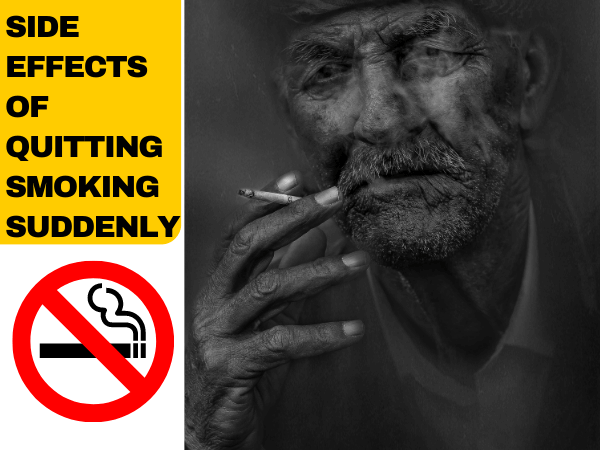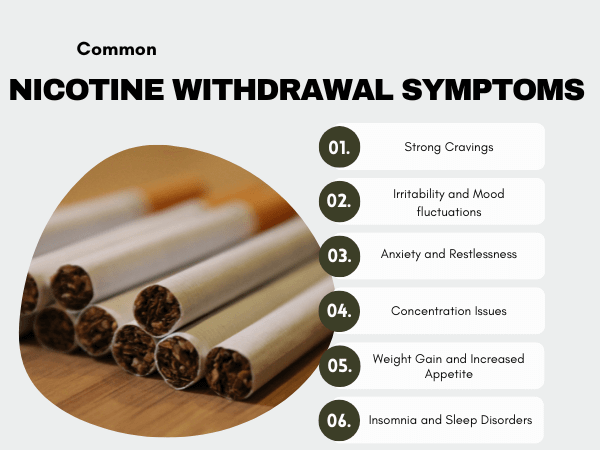Discover the side effects of quitting smoking suddenly. Learn how to manage withdrawal symptoms, cravings, mood swings & stay committed to a smoke-free life.

Table of Contents
Understanding Nicotine Withdrawal
What is Nicotine Withdrawal?
Find out the consequences of quitting smoking suddenly. Learn how to control cravings, mood swings, and withdrawal symptoms while remaining committed to living a smoke-free lifestyle. When someone rapidly ceases utilizing nicotine, an extremely addictive chemical in tobacco-based goods like cigarettes, they experience nicotine withdrawal. When a person smokes frequently, their body develops nicotine dependence. The body adjusts to the lack of this addictive chemical by exhibiting various psychological and physical signs when they abruptly stop using it.
Common Symptoms Experienced During Nicotine Withdrawal

Different symptoms associated with quitting smoking suddenly might occur, each differing in severity and duration for the individual. Among the most typical signs are:
Strong Cravings: One of the main signs of withdrawal is a solid need to smoke. It might be tricky to keep on track with quitting because these desires can be intense and impossible to withstand.
Irritability and Mood fluctuations: During nicotine withdrawal, many people experience irritability, mood fluctuations, or feelings of frustration. The body’s response to the absence of nicotine causes these mood changes.
Anxiety and Restlessness: During withdrawal, anxiety levels may rise, causing feelings of agitation and unease. For people trying to stop smoking, this may not be very pleasant.
Concentration Issues: Withdrawing from nicotine momentarily impairs cognitive abilities, making it more difficult for one to concentrate on tasks.
Weight Gain and Increased Appetite: Some people gain weight after quitting smoking due to increased appetite. Adopting healthy eating practices and maintaining an active lifestyle is critical.
Insomnia and Sleep Disorders: quitting smoking suddenly withdrawal may interrupt sleep cycles, making falling or remaining asleep difficult.
Overview:
For people wishing to quitting smoking suddenly, it is essential to comprehend nicotine withdrawal and the symptoms that go along with it. People can create methods to effectively deal with these issues by being informed of what to anticipate. It’s essential to remember that these sensations are only temporary and will eventually fade away as your body gets used to not smoking. The likelihood of overcoming nicotine withdrawal and quitting smoking can be significantly increased by seeking encouragement from relatives, close companions, or a program for smoking cessation.
Coping with Intense Cravings
Understanding the Nature of Cravings
Cravings are a significant barrier many people face while stopping smoking abruptly. The body’s dependency on nicotine is the cause of these intense desires to smoke. When someone quickly stops smoking, the brain’s reward circuits, which had previously been activated by nicotine, begin to want the drug. As a result, people could have intense cravings, which makes it difficult to resist the urge to smoke.
Strategies to Manage Cravings Effectively
Identify Triggers: The key to managing urges is identifying the triggers that cause them. Situations, feelings, or smoking-related habits might act as triggers. Individuals can create proactive plans to prevent or handle these triggers when they occur by recognizing them.
Distract Yourself: Whenever a craving comes, switching your focus to something else can be helpful. Focus-and-concentration-demanding pursuits like puzzles, hobbies, or exercise can help you divert your attention from the urge.
Use relaxation techniques: As anxiety and stress can make cravings worse. Yoga, meditation, and deep breathing are all examples of methods of relaxation that can be learned and used to help lower stress and better control cravings.
Looking for Assistance and Accountability:
Getting assistance is essential because quitting smoking may prove a complex process. Tell your loved ones about your plans to stop so they can support you and keep you motivated. Getting expert assistance via smoking cessation programs or joining a support group can also offer helpful direction and accountability.
Overview:
It takes resolve and adopting valuable ways to deal with solid cravings after quitting smoking suddenly. Individuals can effectively control cravings and maintain their commitment to their smoke-free journey by comprehending the nature of desires, using diversion tactics, and asking for support from loved ones or support groups. Remember that cravings pass quickly and eventually stop, allowing you to live a healthy, smoke-free life.
Dealing with Mood Swings and Irritability when quitting smoking suddenly
Understanding Emotional Changes
As a side effect of quitting smoking suddenly, mood swings, and irritability are common in those who abruptly stop smoking. Because it is addictive, nicotine impacts the brain’s mood-regulating neurotransmitters. Without a consistent supply of nicotine, the brain changes, which causes mood swings.
Tips for Maintaining Emotional Balance
Self-Awareness: It’s essential to be conscious of your emotional state. Recognize whether you’re agitated or having mood swings, and know that these emotions are expected during the withdrawal process.
Healthy Coping Mechanisms: Look for other coping strategies besides smoking to deal with emotional difficulties. Regular exercise, time in nature, and having social interactions with family, friends, and other people can all improve mood and reduce irritation.
Exercise Patience: Recognize that mood swings and anger will gradually fade as your body gets used to not smoking. Throughout the process of quitting, be patient with yourself.
Overview:
It can be difficult to manage mood swings and anger when smoking suddenly stops, but it’s essential to understand that these emotional changes are transient after quitting smoking suddenly. People can overcome these emotional difficulties and quit smoking by remaining self-aware, implementing healthy coping mechanisms, and exercising patience.
Managing Physical Withdrawal Symptoms
Common Physical Side Effects
People who abruptly stop smoking may experience typical physical withdrawal symptoms such as headaches, light-headedness, coughing, and sore throats. As the respiratory system eliminates mucus and toxins collected from smoking, the body’s detoxification process may result in increased coughing. Additionally, weariness and upset stomach are other potential side effects when the body adjusts to the lack of nicotine and other toxic medications.
Alleviating Discomfort
Maintain Proper hydrated: Properly hydrated can help with physical symptoms and detoxification. Enough water consumption might help relieve throat irritation brought on by frequent coughing.
Medication without a Prescription: Medication without a Prescription can help with headaches or body aches from quitting smoking suddenly symptoms. However, speaking with a medical expert before taking any drug is imperative.
Healthy Eating: A well-balanced diet consisting of vegetables, whole grains, and fruits provides the body with the nutrients it needs to stop and may also alleviate some withdrawal symptoms.
Overview:
It is critical for a successful trip to manage physiological symptoms of quitting smoking suddenly, while abruptly stopping smoking effectively. Understanding typical side effects and employing techniques such as staying hydrated, using suitable over-the-counter medications, and maintaining a nutritious diet can dramatically lessen difficulty during quitting. Understand that these physical signs are body mending and will fade as you transition to a healthier, smoke-free lifestyle.
Sleep Disturbances and Fatigue
As part of the withdrawal process, it is usual to have sleep difficulties and exhaustion while abruptly quitting smoking.
Understanding Sleep Challenges
Insomnia: Many people have trouble sleeping or staying asleep when quitting smoking. Daytime agitation and restlessness can result from insomnia.
Sleep Pattern Disruption: As your body adjusts to the lack of nicotine, your sleep patterns could get erratic. As a result, you can have lethargy or exhaustion all day.
Tips for Improving Sleep
Establish a Bedtime ritual: Set up a calming bedtime ritual to tell your body it’s time to unwind. As the blue light from electronics might disrupt sleep, avoid using them before bed.
Limit Stimulants: After quitting smoking suddenly, try to avoid or cut back on caffeine and cigarettes, disturbing sleep cycles and exacerbating insomnia.
Make Your Bedroom a Pleasant Sleep Environment: Ensure your bedroom is calm, dark, and quiet.
Addressing Psychological Challenges
Coping with Stress and Anxiety
Individuals who quitting smoking suddenly, frequently experience psychological difficulties, such as increased stress and worry. Nicotine, as a mood-altering chemical, can provide temporary relief from anxiety. While a result, without cigarettes, people may suffer increased tension while their bodies adjust to the lack of nicotine.
Breaking Habitual Associations with Smoking
Create Alternative Routines: after quitting smoking suddenly, it is advised that one must Create alternative routines can assist in breaking links with smoking. For example, if you used to smoke during your breaks at work, replace it with a short stroll or deep breathing exercise.
Find Healthy Outlets: Learning new coping strategies for stress and anxiety is critical after quitting smoking suddenly. Participate in activities that promote relaxation and emotional well-being, such as painting, music, or time spent in nature.
Seek Professional Help: If you find it difficult to cope with psychological issues, try obtaining help from a therapist or counselor. Professional assistance can provide valuable skills for efficiently managing stress and emotional triggers.
Overview:
Addressing psychological issues associated with abrupt smoking cessation necessitates resilience and the use of suitable coping methods. Understanding how nicotine affects anxiety and stress levels is critical. Individuals can negotiate psychological challenges and keep a positive outlook throughout their road to a smoke-free life by breaking compulsive associations with cigarette smoking, creating fresh routines, seeking healthy outlets, and getting professional support when needed.
Final Takeaway
Quitting smoking suddenly comes with side effects, but remember, you can cope with them.
Celebrate each achievement after quitting smoking suddenly; quitting smoking for a day, a week, or a month is an accomplishment to be proud of. Accept the help of family and friends, or look for a group to encourage you.
After quitting smoking suddenly, you might experience cravings, mood swings, and physical withdrawal symptoms, but keep your composure and fortitude. For a healthier body and mind, distract yourself with things you enjoy, try mindfulness exercises, and stay active.
Don’t give up hope despite potential setbacks. Reiterate your resolve to quit and learn from your mistakes to become stronger. You’re on a transformational path, and if you’re persistent, you’ll embrace a healthier, happier life without smoking. We are here to support you every step of the way as you take control of this sound change. There are difficulties, but you have what it takes to go through them. You can do this.
FAQ
What happens when you quit smoking timeline?
The timetable follows when you stop smoking: Heart rate decreases after a while. Senses get better over days. Lung function improves over weeks. Years with fewer dangers.
How to ease nicotine withdrawal?
To ease nicotine withdrawal, stay hydrated, engage in regular exercise, distract yourself with activities, and seek support from loved ones or support groups.
How to quit smoking cold turkey?
To quit smoking cold turkey, set a quit date, remove triggers, seek support, and stay committed. Avoid nicotine replacements and rely on willpower.

